- Home
- Georgette Heyer
Black Sheep Page 26
Black Sheep Read online
Page 26
Seventeen
Meanwhile, Mr Stacy Calverleigh's star had been in the ascendant, and this in spite of his uncomfortably diminishing resources. He had been obliged to hang up his shot at the White Hart for several weeks; and he knew that only his increasing intimacy with the wealthy Mrs Clapham was restraining the proprietor of this establishment from indicating that the settlement of his bill would be appreciated. His efforts to persuade the widow to remove to Leamington had failed, and he had been obliged to show himself in public with her more often than was prudent; but these were small evils when compared with Mrs Clapham's coquettish encouragement of his advances. He had not enjoyed his session with Mr James Wendover, but he had been swift to turn it to good account. He had taken great pains over the letter he had written to Fanny, and by the time he had polished its well-turned phrases, and copied the whole out fair, he really felt that in renouncing her he was behaving as nobly as he expected her to believe. He was a little afraid that she might address a passionate reply to him, or even accost him in public, and silently cursed the obstinacy of Mrs Clapham in refusing to withdraw from Bath; but when he received no letter from Fanny, and was accorded only a slight, distant bow from her when her carriage was held up by the usual press of traffic in Cheap Street, his mind was relieved of care, and he felt himself to be at liberty to pop the question to Mrs Clapham.
It had not occurred to him that he might meet with a refusal, nor did her response to his proposal alarm him.
'Marry you?' said Mrs Clapham, laughing. 'Me? Good gracious no!'
He took this for coyness, and was rather impatient of it, but he said, in his most caressing voice: 'I think it was your sportive playfulness which made me tumble headlong in love with you. And I had believed myself to be case-hardened!'
Her next words were disturbing. 'Well, by what I'm told, you weren't so case-hardened but what you were making up to that pretty little girl who bowed to you in Cheap Street, before I came to Bath!'
It was the manner in which she spoke which disturbed him more than her words. There had always been a danger that she might discover how particularly he had attached himself to Fanny, and he knew just how to deal with that. He was unprepared for the change in her voice, and in her demeanour, and it startled him. He had hitherto supposed her to be a silly, fluttering little ingénue, but she was not looking at all ingenuous, and her voice was not only decidedly tart, but it had lost some of its gentility. It disconcerted him, but only momentarily: he realised that she was suspicious of a rival, and jealous of her. He laughed, flinging up his hands. 'What, little Fanny Wendover? Oh, Nancy, Nancy, you absurd and adorable witch! My dear, do you know how old she is? Seventeen! Not out of school yet!'
'More shame to you!' she said.
'Yes, indeed, if I had made up to her. Oh, these Bath quizzies! I warned you how it would be! But I own I did not think that at my age I should be suspected of dangling after a mere child only because I took notice of her, and indulged her with a little very mild flirtation!'
He trod over to her chair, and dropped gracefully on to his knee, and possessed himself of her hands, smiling up into her face. 'I have had many flirts, but never a true love till now!' he
said whimsically.
'Well, you haven't got one in me!' said Mrs Clapham. 'I've had many flirts too, but I've no wish for a husband, so you may as well stop making a cake of yourself ! Going down on your knees, as if you was playing Romeo!'
'I know how unworthy of you I am, but I dared to hope you were not indifferent to me!' he persevered.
'Get up, do!' responded the lady unromantically, pulling her hands away.
He obeyed her, looking remarkably foolish, and shaken quite off his balance. He stammered: 'How is this? It cannot be that you have been trifling with me! I cannot believe you could be so heartless!'
'Oh, can't you?' she retorted, getting up, and shaking out her skirt. 'Now, you listen to me, Mr Flat-catching Calverleigh! It don't become you to talk of hearts, and it isn't a particle of use pitching me any more of your gammon, because I'm up to all the rigs! We've had an agreeable flirtation, and the best thing you can do now is to own yourself beaten at your own game, and take yourself off ! Otherwise you might hear a few things you wouldn't relish. Taking notice of a school-girl! Cutting a sham with an heiress is what you were doing, and not for the first time, I'll be bound! Well, I don't want to say anything un ladylike, but,' she ended, overcoming this reluctance, 'you're one as would marry a midden for muck, and that's the truth!'
He was white with mingled shock and rage. He opened his mouth to speak, but shut it again, for there was nothing he could say. He turned, and walked out of the room.
His was not a sensitive nature. He could shrug off a snub; he could listen with indifference to the strictures of Mr James Wendover. But Mr Wendover's contempt had been expressed with icy propriety. No one had ever torn his character to shreds with the crude vulgarity favoured by Mrs Clapham, and it was some time before he could in any way recover from his fury. It was not the truth of what she had said that provoked this fury: it was her incredible insolence in daring to address him – a Calverleigh! – in such terms.
When his rage abated, it was succeeded by fear, a more deadly fear than he had ever before experienced, for it was unattended by even a glimmer of optimism. There was no way left to him of staving off his creditors; he would be forced to pawn his few pieces of jewellery to enable him to pay his shot at the White Hart, and to buy himself a seat on the stage-coach to London. He tried to think of someone from whom he might be able to borrow a hundred pounds, or even fifty pounds, but there was no one – certainly no one in Bath.
He had reached the point of entertaining wild thoughts of abandoning his luggage, and escaping from the White Hart with his bill unpaid, when he was interrupted by the entrance of one of the waiters, who presented him with a letter, which had been brought, he said, by one of the servants employed at the York House Hotel.
Stacy did not recognise the careless scrawl, but when he spread open the single sheet he found that it was from his uncle, and briefly invited him to dine at York House that evening.
His first impulse was to send back a refusal. Then it occurred to him that he might be able to induce Miles to lend him some money, even if it was only a pony. He must be fairly flush in the pocket, he thought, for although he bore none of the signs of being well-inlaid he was again putting up at the most expensive hotel in Bath, which he could not have done had he left his shot unpaid when he went off to London so suddenly. He bade the waiter stay a moment while he wrote a reply to his uncle's letter, and was considerably provoked when he learned that the messenger had departed, having been told that no answer was expected. Coupled with the curt nature of the invitation, which might well have been mistaken for a command, this amounted to an affront, and set up Stacy's bristles. He decided to overlook it: his uncle's manners were deplorably casual, and probably he had had no intention of offending.
Upon arrival at York House, he was taken to Miles Calverleigh's sitting-room, where the table had already been laid for dinner. Determined to please, he exerted himself to be an affable, conversable, and even deferential guest. He praised the excellence of the dishes set before him; he said that it was not often that he was offered burgundy of such rare quality; he recounted such items of Bath-news as might be supposed to be of interest; he tried to draw Miles out on the subject of India. Miles regarded him with an amused eye, contributed little to the conversation, but outdid him in affability.
When the cloth had been removed, and the brandy placed on the table, Stacy said, with his air of rueful frankness: 'I must tell you, sir, that I was devilish glad to get your letter! I've been drawing the bustle a trifle too freely, and find myself on the rocks. Only temporarily, of course, but I've no banking accommodation in Bath, which puts me in a stupid fix. I don't like to ask it of you but I should be very grateful if you could lend me a trifle – just to keep me in pitch and pay over an awkward period, you know!
'
His uncle removed the stopper from the decanter in his leisurely way, and poured brandy into the glasses. 'No, I won't lend you money,' he said.
He spoke with his usual amiability, but there was something in his voice which Stacy had never heard before. It was almost an implacable note, he thought. Surprised, and slightly nettled, he said: 'Good God, sir, I don't want any considerable sum!'
Miles shook his head. Without quite knowing why, Stacy felt a stir of alarm in his breast. He forced up a laugh. 'If you must have it, sir, it's damned low water with me – until I can
bring myself about! I haven't sixpence to scratch with!'
'I know you haven't.'
The placidity with which this was uttered made Stacy flame into anger. He jumped up, his hands clenching and unclenching.
'Do you indeed? Well, let me tell you, my very dear uncle, that unless I can be given time to find some means of raising the recruits there will be a writ of forfeiture served on me!'
'Oh, it needn't come to that!'
'Needn't come to it? Are you quite blubber-headed? Don't you –'
Miles laughed. 'No, no, I'm not at all blubber-headed!'
'I beg pardon!' Stacy said, choking down his rage. 'I didn't mean to say that! The thing is –'
'No need to apologise,' said Miles kindly. 'No need to tell me what the thing is either.'
'I am afraid, sir,' said Stacy, trying to speak politely, 'that owing, no doubt, to your long residence abroad you are not familiar with the – the various conditions attached to mortgages. I must explain to you –'
'You are in arrears with the interest, and you have no possible means of paying up. Sit down!' He picked up his glass, and sipped some of the brandy in it. 'That's why I sent for you.'
'Sent for me?' interrupted Stacy.
'Did I say sent for you? It must have been a slip of the tongue. Begged for the honour of your company!'
'I cannot imagine why,' muttered Stacy resentfully.
'Just on a matter of business. I want two things from you: one is an equity of redemption; the other is Danescourt – by which is to be understood the house, and the small amount of unencumbered land on which it stands. For these I am prepared to forgo the interest owing on the existent mortgages, and to pay you fifteen thousand pounds.'
Stacy was so thunderstruck by these calmly spoken words that his brain whirled. He almost doubted whether he had heard his uncle aright, for what he had said was entirely fantastic. Feeling dazed and incredulous, he watched Miles stroll over to the fire, and take a spill from a jar on the mantelpiece. He found his voice, but only to stammer: 'B-but – equity of redemption – why, that means – Damn you, is this your notion of a joke?'
'No, no, I never cut jokes in business!' replied Miles. He came back to his chair, a lighted cheroot between his fingers, and sat down again, stretching his long legs out before him, with one ankle crossed over the other, after his usual fashion. He regarded his stunned nephew with mild amusement, and said: 'I'm a very rich man, you know.'
Since Stacy knew nothing of the sort, he felt more strongly than before that he had strayed into a world of fantasy. 'I don't believe it!' he blurted out.
'I am afraid,' said Miles, apologetically, 'that you have been misled into thinking that because I've no fancy for rigging myself out in the first style of elegance, cutting a dash, or saddling myself with a multitude of things I haven't the least wish to possess, I must be as cucumberish as you are yourself. You should never judge by appearances, nevvy!'
It seemed monstrous to Stacy that his uncle should not have informed him that he was in affluent circumstances. He exclaimed hotly: 'You have been deceiving me, then! Deliberately deceiving me!'
'Not at all. You deceived yourself. That isn't to say that I wouldn't have deceived you, had it been expedient to do so. But, to own the truth, it was of no consequence to me whether you thought me a Nabob or a Church rat. Except, of course,' he added reflectively, 'that if you had known I was full of juice I should have found you an intolerable nuisance. You see, I never lend money without security.'
Stacy reddened, but said: 'If you can indeed afford to buy up the mortgages – if you don't wish to see Danescourt pass out of our hands – if you are willing to help me to bring myself about – we could come to some agreement! We could –' He broke off, encountering his uncle's eyes, and seeing in them a look as implacable as the note he had detected in his voice. There was no smile in them, and no warmth; nor could he perceive in them anger, impatience, contempt, or any human emotion whatso ever. They were coldly dispassionate, and as hard as quartz.
'You know, you labour under too many misapprehensions,' said Miles pleasantly.
'But – Good God, you can't dispossess me!'
'What makes you think so?'
'You wouldn't! We are both Calverleighs! You are my uncle!'
'You have a remarkably false notion of my character if you think that that circumstance will prevail upon me to maintain Danescourt for your benefit. I can't think where you came by it.'
The brief, vague vision of being able once more to draw upon his estates for his needs faded. Miles had spoken amiably, but with finality. Stacy was conscious of an unreasoning resentment. He said: 'What is it to you? Much you care for being Calverleigh of Danescourt! Or is that it?'
'Oh, lord, no! I care for Danescourt, that's all.'
'That's what I said!'
'It's not what you meant, or what I mean. I want Danescourt because I'm fond of it, and for the same reason I won't see it fall into ruins. If I weren't, I wouldn't lift a finger to save it. All that fiddle-faddle you talk about being Calverleigh of Danescourt don't mean a thing to me.'
'Coming it too strong, uncle! And just as well if it were true, for I am the head of the family, and while I'm alive I am Calverleigh of Danescourt!'
'Yes, yes!' said Miles, on a soothing note. 'You can go on calling yourself Calverleigh of Danescourt, or anything else you like: I've no objection.'
'How the devil can I do so if I don't own even the house?' demanded Stacy hotly. 'I'll sell you an equity of redemption, but I'll not sell the house or the demesne!'
'Well, once I foreclose, you won't have any choice in the matter, will you? You'll be glad to sell it to me at any figure I name.'
Stacy stared at him, very white about the mouth. 'You'd do that? Foreclose on me – your own nephew! – force me out of my very birthplace? My God, is that what you've been doing all these years? Waiting for the chance of revenge?'
'No, I've been far too busy. I wish you would rid your mind of its apparent conviction that I think myself hardly used. I don't, and I never did. I didn't like your grandfather, or your father either, but I've often been grateful to them for the good turn they didn't know they'd done me. India suited me down to the ground. What's more, if they hadn't sent me there I might never have discovered that I had a turn for business. But I had, Stacy, and you'd do well to bear it in mind. When you prate to me about our relationship, you're wasting your time. Sentiment has no place in business, even if I had any, which I haven't. As for your talk about revenge, it's balderdash! I don't like you any more than I liked your father – in fact, less – but why the devil should I want to be revenged on you?'
'On him! Because I am his son!'
'Good God! You must have watched the deuce of a lot of melodramas in your time! Until I met you, I'd no feeling for you of any kind: why should I? If I had found Danescourt as I'd left it – or if I'd even found you making a push to restore it – I shouldn't have interfered. But I didn't. I had been warned of it, which was why I decided to come home, but I wasn't prepared –'
'It wasn't my fault!' Stacy said quickly, his colour surging into his face. 'It was my father who granted the first mortgage! He was in Dun territory when he died, and how the devil could I –'
'Don't excuse yourself ! It makes no odds to me which of you let it fall into decay.'
'I should have been glad enough to set it in order, but I hadn't th
e means!'
'No, and as you wouldn't have spent a groat more than you were obliged to on it if you had had the means, and would sell it tomorrow, if you could find a fool willing to purchase a place which you described to me, on the occasion of our first meeting, as a damned barrack, mortgaged to the hilt, and falling into ruin besides, I am now going to relieve you of it.'
'You'd be better advised to leave it in my possession! What do you imagine will be said of you, if you – you usurp my place?'
'Well, according to Colonel Ongar, my arrival will be regarded in the light of a successful relieving force. You seem to have made yourself odious to the entire county.'
'Exactly as you did, in fact!'
'No, no, I was never odious ! Merely a scapegrace! My youthful sins will be forgiven me the moment I remove the padlock from the main gate, and cut down that hayfield of yours. I must say, I don't at all care for it.'

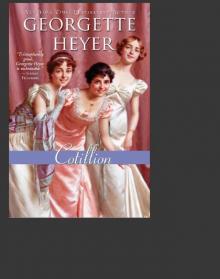 Cotillion
Cotillion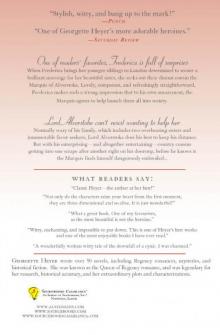 Frederica
Frederica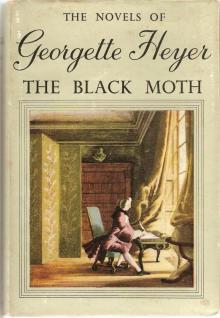 The Black Moth: A Romance of the XVIIIth Century
The Black Moth: A Romance of the XVIIIth Century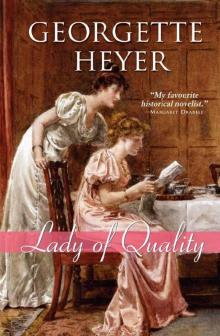 Lady of Quality
Lady of Quality Snowdrift and Other Stories
Snowdrift and Other Stories An Infamous Army
An Infamous Army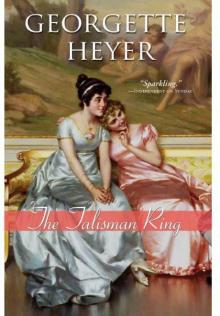 The Talisman Ring
The Talisman Ring Venetia
Venetia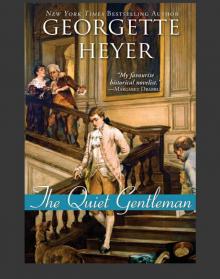 The Quiet Gentleman
The Quiet Gentleman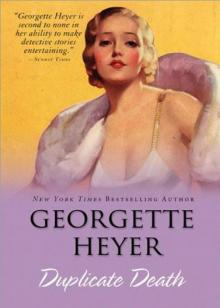 Duplicate Death
Duplicate Death Cousin Kate
Cousin Kate Black Sheep
Black Sheep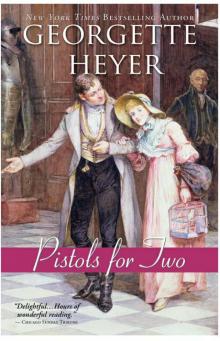 Pistols for Two
Pistols for Two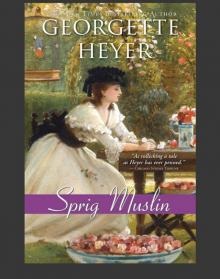 Sprig Muslin
Sprig Muslin No Wind of Blame
No Wind of Blame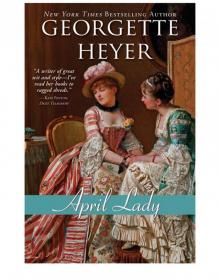 April Lady
April Lady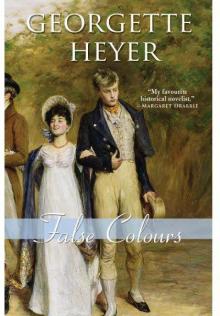 False Colours
False Colours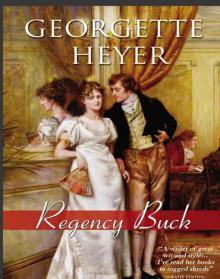 Regency Buck
Regency Buck The Toll-Gate
The Toll-Gate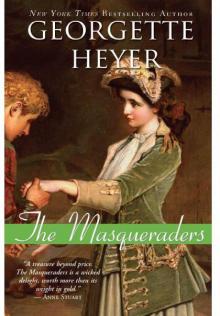 The Masqueraders
The Masqueraders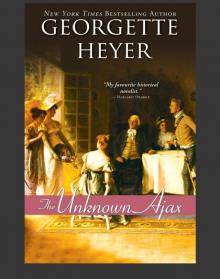 The Unknown Ajax
The Unknown Ajax The Grand Sophy
The Grand Sophy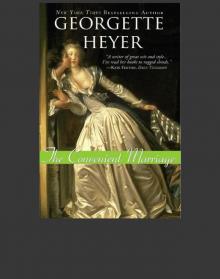 The Convenient Marriage
The Convenient Marriage Faro's Daughter
Faro's Daughter The Conqueror
The Conqueror The Foundling
The Foundling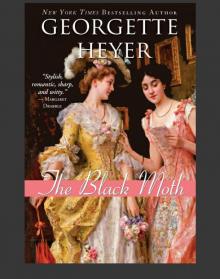 The Black Moth
The Black Moth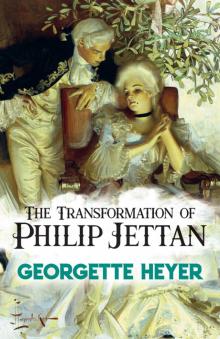 The Transformation of Philip Jettan
The Transformation of Philip Jettan Friday's Child
Friday's Child Beauvallet
Beauvallet They Found Him Dead
They Found Him Dead Charity Girl
Charity Girl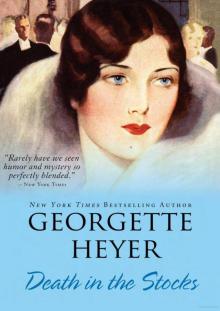 Death in the Stocks: Merely Murder
Death in the Stocks: Merely Murder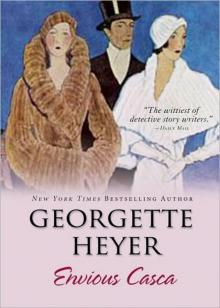 Envious Casca
Envious Casca Behold, Here's Poison
Behold, Here's Poison Arabella
Arabella The Nonesuch
The Nonesuch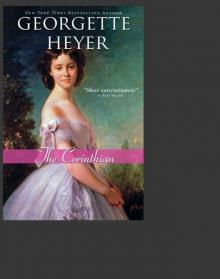 The Corinthian
The Corinthian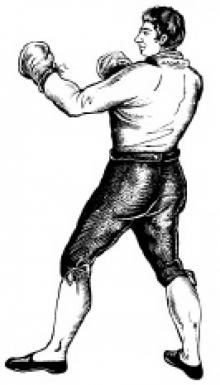 Jennifer Kloester
Jennifer Kloester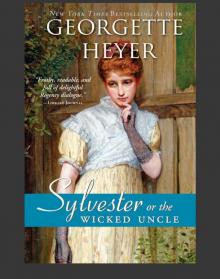 Sylvester
Sylvester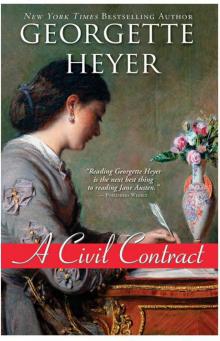 A Civil Contract
A Civil Contract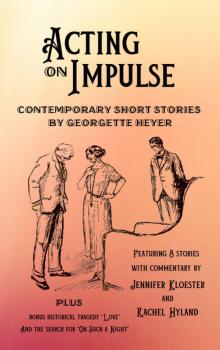 Acting on Impulse
Acting on Impulse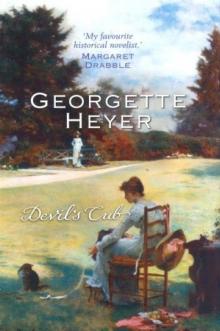 Devil’s Cub at-2
Devil’s Cub at-2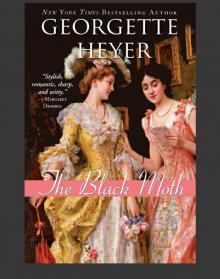 Black Moth
Black Moth Grand Sophy
Grand Sophy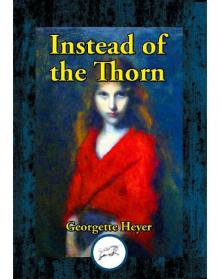 Instead of the Thorn
Instead of the Thorn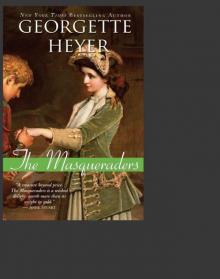 Masqueraders
Masqueraders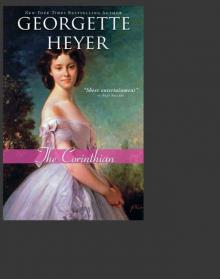 Corinthian
Corinthian Reluctant Widow
Reluctant Widow